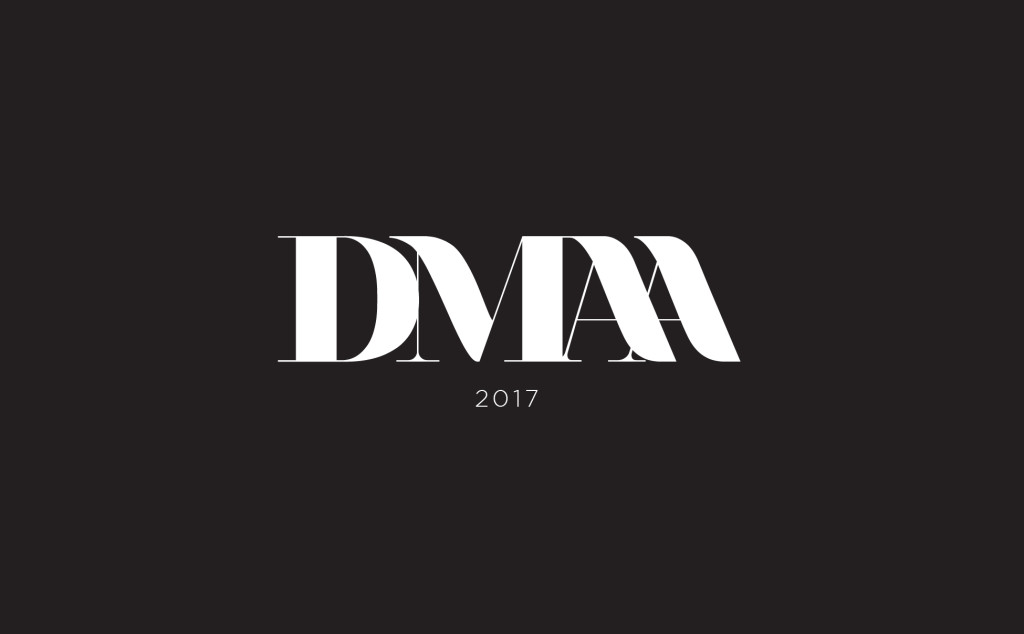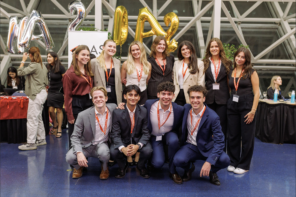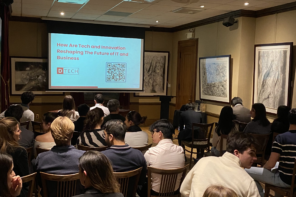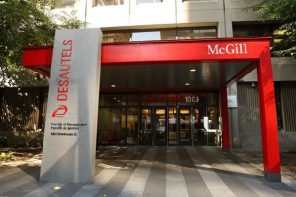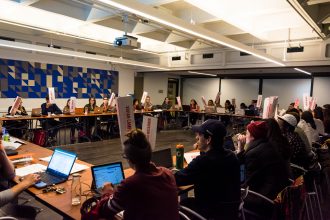On Friday, February 10th, the Faculty of Management held the 37th Desautels Management Achievement Awards (DMMA) at the Ritz-Carlton, Montreal. This prestigious, annual event recognizes distinguished business leaders from around Canada in honour of their career achievements and social impact. The luncheon also gives students the opportunity to network and hear from the award recipients.
The winners this year were two McGill alumni, Mitch Garber and Norman Jaskolka. Desautels students chose them based on their outstanding leadership, success in the business world, entrepreneurship, mindfulness, philanthropy, and corporate social responsibility.
Mitch Garber
The first recipient of the afternoon, Mitch Garber, is the current CEO of Caesars Acquisition Company, which owns Caesars Interactive Entertainment and the World Series of Poker, and the Chairman of Cirque Du Soleil. He is also well known for his role as a “dragon” in the Canadian television series Dans l’Oeil du Dragon. In addition to his vast success in the business world, he invests much of his time and money in philanthropy and is an active participant in the McGill, Canadian, and international communities. However, Mr. Garber’s journey to success was not an easy one. In his acceptance speech, Garber spoke about the significance that failure has on defining an individual’s character and success. “Speaking about failure is important because it’s very easy as a young person to become discouraged,” he said, “but what’s important is how you deal with failure and rejection and what degree of resiliency you have and you can show.” Having been rejected from every law school in Montreal, he maintained a spirit of resilience and was ultimately accepted to attend the University of Ottawa where he finally earned his law degree. Garber also touched on the importance of dealing with the unexpected in the business world. In fact, Garber learned this lesson at a young age. “At 14 years old I took over a small canteen,” he recounted, “and each week I would take the profits of the food and I would buy the next week’s food trying to keep a little bit of profit at the end of each week, so that by the end of the summer I had some. I remember distinctly a day in 1978 where there was a power failure in the canteen, and I had just gotten a new order of hot dogs. 300 hot dogs melted in that freezer and I started to cry, because it made me realize something: That in business the unexpected is going to happen to you, and that when you’re 14 you can cry, but when you’re 52 you can’t cry, and when you’re 24 you can’t cry. So the idea is that what are you going to do when your hot dogs melt? And you have no money to order new hot dogs, and that is the reality of the business world.” He went on to those he has found to be the most successful in the business world: the hard workers, the people who are most different, those “without a copy-paste CV and life story,” the people who know their industry better than anyone, the ones who take initiative, and finally, the ones who can take the high road and maintain their integrity regardless of the circumstances. Lastly, he reminded the audience of their fortune and consequently of the philanthropic power that they hold. “All of you sitting in the Ritz-Carlton hotel, all of you who are studying at one of the world’s finest institutions, will get degrees, will get internships, will get jobs, will be ably employed, all will be in that global one-percent, and as a result of being in that global one-percent you are lucky,” he said, “and you have an obligation, within your means, to help all of those who have not had the same lucky path and fortune that you have.”
Norman Jaskolka
The second DMAA recipient of the afternoon was Norman Jaskolka. He is currently president of the ALDO Group International, which he joined in 1995 as the vice-president of corporate planning after working in accounting at Ernst & Young for 20 years. His success in accounting has been such that he was awarded the title of Fellow of the Order of Chartered Accountants of Quebec. After joining ALDO Group International, he was able to bring the Montreal-born company to the international position it holds today. Jaskolka’s ongoing curiosity, risk taking, and innovation have led him to speak various times at the World Retail Congress and National Retail Federation. In 2012, the minister of economic development, innovation and export gave him the responsibility of revitalizing, sustaining, and developing the fashion industry in Montreal and Quebec. Jaskolka also invests much of his time in community organizations like the Federation CJA, the Montreal Holocaust Memorial Centre, the Old Brewery Mission, and Sheela Bal Bhavan, a home for girls in India. Like Garber, Jaskolka emphasized that victory goes hand in hand with perseverance, especially when all odds are against you. He spoke of the long journey that his parents, two Holocaust survivors, went through to overcome adversity. After the war, they came to Canada with no money, in poor health, no education, and no language skills. Nevertheless, they did what they could to open their own business, and provide a bright future for their children. Jaskolka also stressed the importance of self-awareness; he preached, “As a starting point, it’s important to know who you are. It’s important that you know yourself and appreciate what you like to do. Accept who you are and revel in it. As the years go by, you will get to know yourself better and you will learn what works for you. If you know who you are and focus in that direction, you will succeed.” Additionally, Jaskolka reminded the audience that success is not a matter a talent but rather a matter of effort, and that failure is inescapable and a primary stepping stone to achieve our dreams. His recommendation to the audience was to take failure as a learning opportunity because the only real failure is “the one from which you learn nothing.” With great hope for the future, Jaskolka concluded, “I say to you, that you never know what waits you around the corner. It could be nothing, or it could be everything. So keep putting one foot in front of the other and then, one day, look back and see how high and far you’ve come.”

